Accounting for Managers: JB-Hi-Fi Financial Reporting Analysis
VerifiedAdded on 2021/04/21
|12
|2895
|79
Report
AI Summary
This report provides a detailed analysis of JB-Hi-Fi's financial reporting, corporate governance, and accounting practices. It begins with a definition of corporate governance and its increasing importance, followed by an examination of JB-Hi-Fi's compliance with the principle of safeguarding the integrity of financial reporting. The report then defines goodwill and outlines reporting requirements for ASX-listed companies, supported by an analysis of relevant sections from JB-Hi-Fi's annual report, including goodwill impairments. Finally, it defines the Independent Auditors Report and performs a comparative study of JB-Hi-Fi's audit reports for 2016 and 2017, highlighting key changes. The report references the Corporations Act 2001 and relevant accounting standards throughout its analysis, providing a comprehensive overview of JB-Hi-Fi's financial performance and governance.
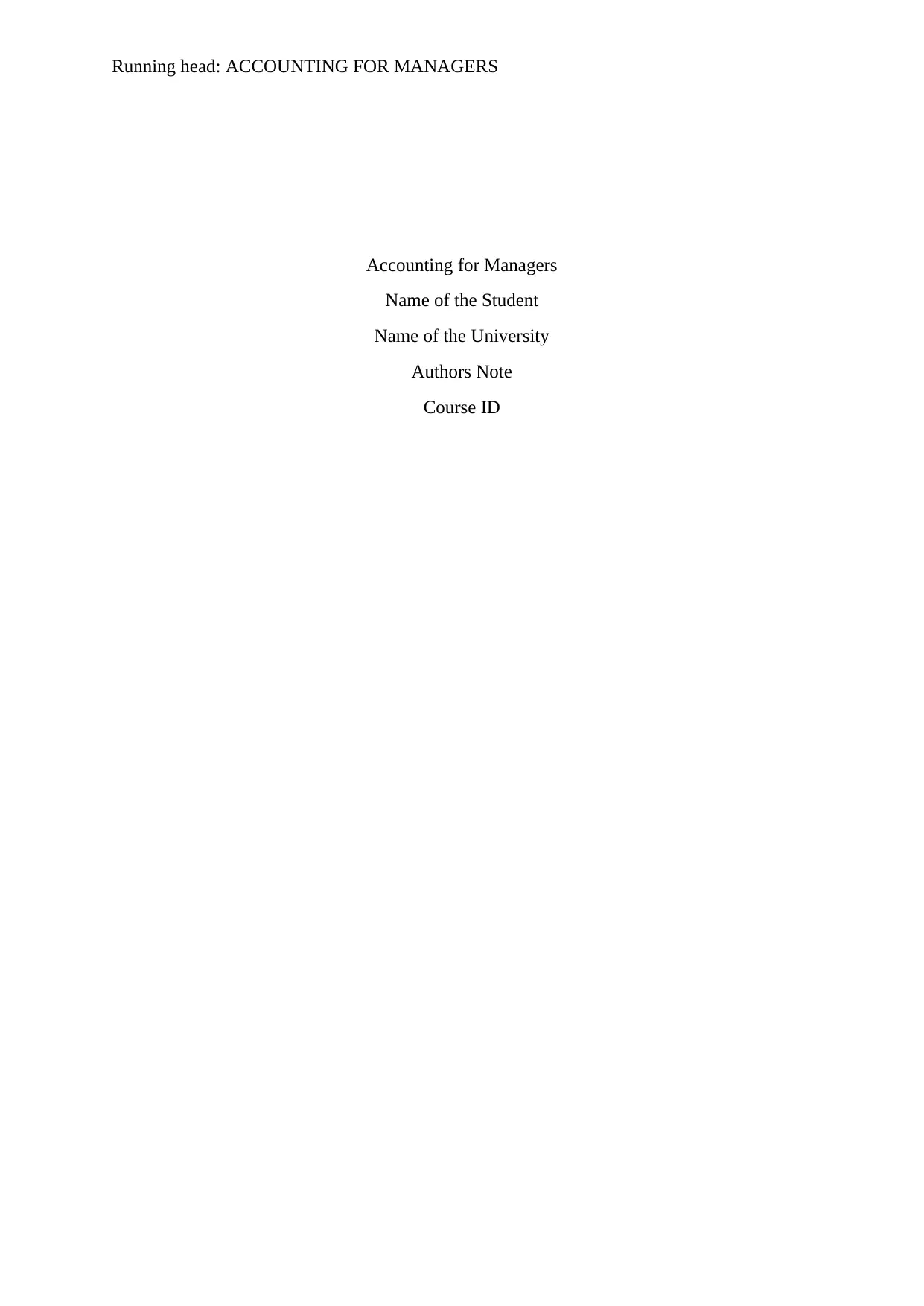
Running head: ACCOUNTING FOR MANAGERS
Accounting for Managers
Name of the Student
Name of the University
Authors Note
Course ID
Accounting for Managers
Name of the Student
Name of the University
Authors Note
Course ID
Paraphrase This Document
Need a fresh take? Get an instant paraphrase of this document with our AI Paraphraser
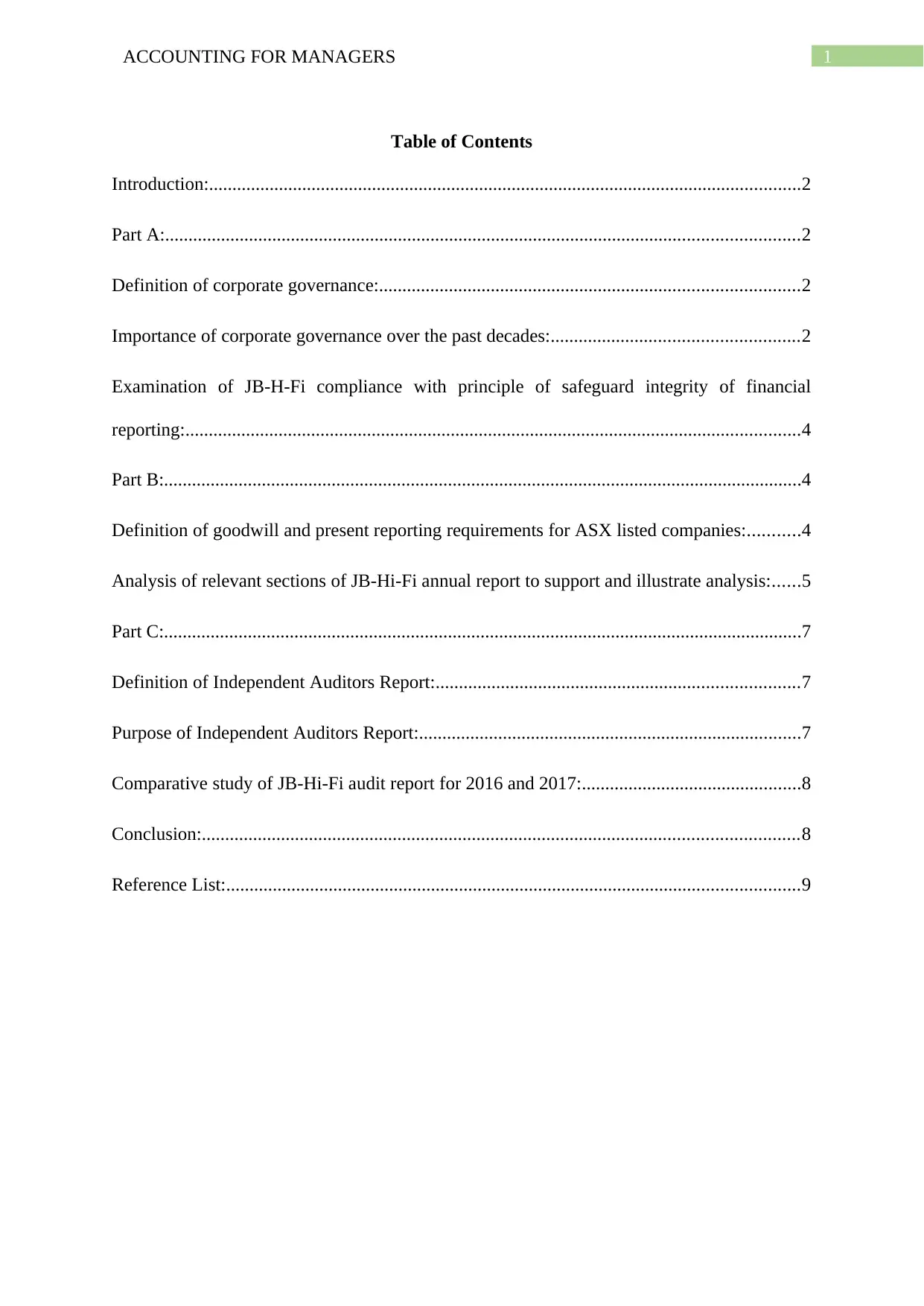
1ACCOUNTING FOR MANAGERS
Table of Contents
Introduction:...............................................................................................................................2
Part A:........................................................................................................................................2
Definition of corporate governance:..........................................................................................2
Importance of corporate governance over the past decades:.....................................................2
Examination of JB-H-Fi compliance with principle of safeguard integrity of financial
reporting:....................................................................................................................................4
Part B:.........................................................................................................................................4
Definition of goodwill and present reporting requirements for ASX listed companies:...........4
Analysis of relevant sections of JB-Hi-Fi annual report to support and illustrate analysis:......5
Part C:.........................................................................................................................................7
Definition of Independent Auditors Report:..............................................................................7
Purpose of Independent Auditors Report:..................................................................................7
Comparative study of JB-Hi-Fi audit report for 2016 and 2017:...............................................8
Conclusion:................................................................................................................................8
Reference List:...........................................................................................................................9
Table of Contents
Introduction:...............................................................................................................................2
Part A:........................................................................................................................................2
Definition of corporate governance:..........................................................................................2
Importance of corporate governance over the past decades:.....................................................2
Examination of JB-H-Fi compliance with principle of safeguard integrity of financial
reporting:....................................................................................................................................4
Part B:.........................................................................................................................................4
Definition of goodwill and present reporting requirements for ASX listed companies:...........4
Analysis of relevant sections of JB-Hi-Fi annual report to support and illustrate analysis:......5
Part C:.........................................................................................................................................7
Definition of Independent Auditors Report:..............................................................................7
Purpose of Independent Auditors Report:..................................................................................7
Comparative study of JB-Hi-Fi audit report for 2016 and 2017:...............................................8
Conclusion:................................................................................................................................8
Reference List:...........................................................................................................................9
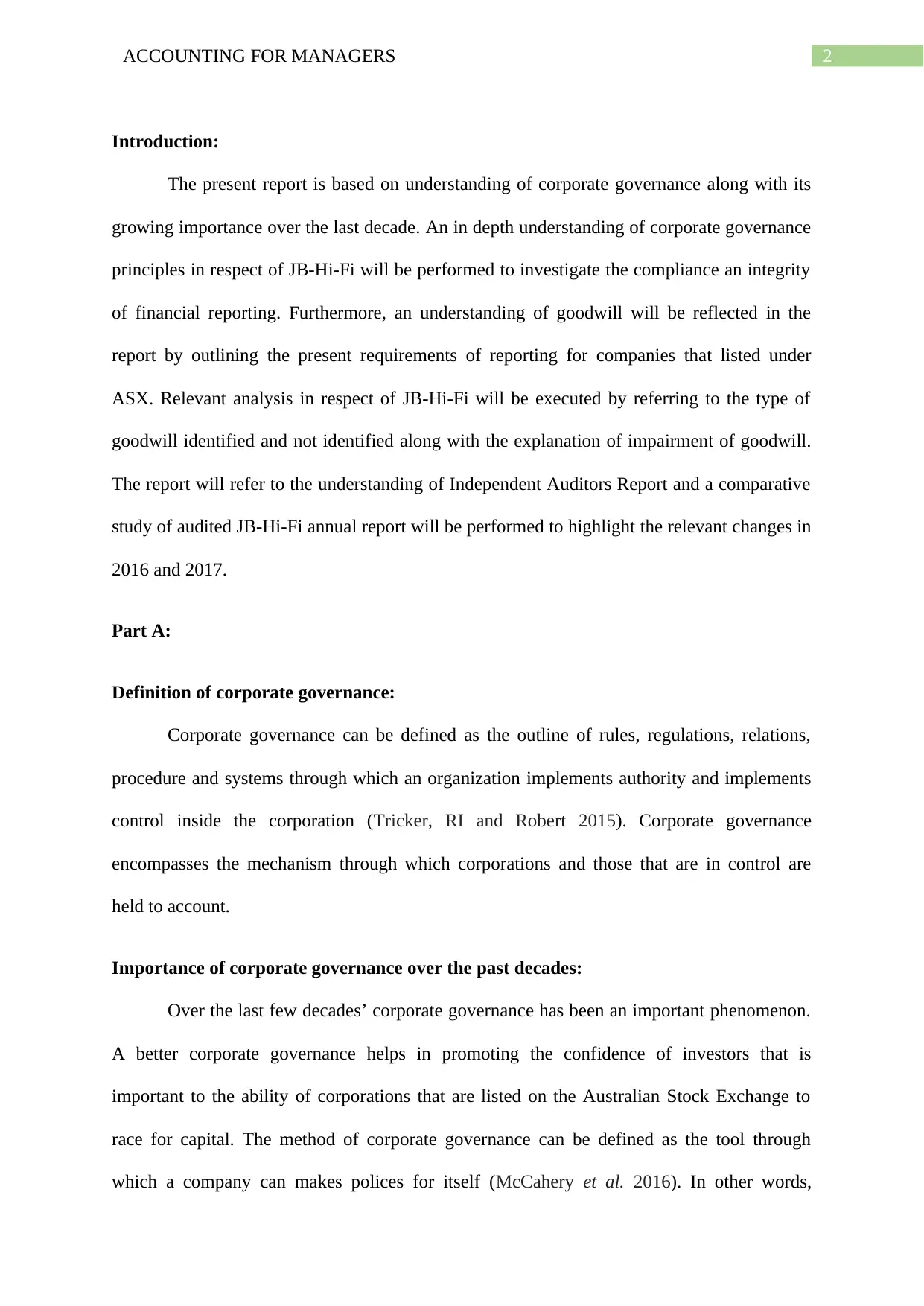
2ACCOUNTING FOR MANAGERS
Introduction:
The present report is based on understanding of corporate governance along with its
growing importance over the last decade. An in depth understanding of corporate governance
principles in respect of JB-Hi-Fi will be performed to investigate the compliance an integrity
of financial reporting. Furthermore, an understanding of goodwill will be reflected in the
report by outlining the present requirements of reporting for companies that listed under
ASX. Relevant analysis in respect of JB-Hi-Fi will be executed by referring to the type of
goodwill identified and not identified along with the explanation of impairment of goodwill.
The report will refer to the understanding of Independent Auditors Report and a comparative
study of audited JB-Hi-Fi annual report will be performed to highlight the relevant changes in
2016 and 2017.
Part A:
Definition of corporate governance:
Corporate governance can be defined as the outline of rules, regulations, relations,
procedure and systems through which an organization implements authority and implements
control inside the corporation (Tricker, RI and Robert 2015). Corporate governance
encompasses the mechanism through which corporations and those that are in control are
held to account.
Importance of corporate governance over the past decades:
Over the last few decades’ corporate governance has been an important phenomenon.
A better corporate governance helps in promoting the confidence of investors that is
important to the ability of corporations that are listed on the Australian Stock Exchange to
race for capital. The method of corporate governance can be defined as the tool through
which a company can makes polices for itself (McCahery et al. 2016). In other words,
Introduction:
The present report is based on understanding of corporate governance along with its
growing importance over the last decade. An in depth understanding of corporate governance
principles in respect of JB-Hi-Fi will be performed to investigate the compliance an integrity
of financial reporting. Furthermore, an understanding of goodwill will be reflected in the
report by outlining the present requirements of reporting for companies that listed under
ASX. Relevant analysis in respect of JB-Hi-Fi will be executed by referring to the type of
goodwill identified and not identified along with the explanation of impairment of goodwill.
The report will refer to the understanding of Independent Auditors Report and a comparative
study of audited JB-Hi-Fi annual report will be performed to highlight the relevant changes in
2016 and 2017.
Part A:
Definition of corporate governance:
Corporate governance can be defined as the outline of rules, regulations, relations,
procedure and systems through which an organization implements authority and implements
control inside the corporation (Tricker, RI and Robert 2015). Corporate governance
encompasses the mechanism through which corporations and those that are in control are
held to account.
Importance of corporate governance over the past decades:
Over the last few decades’ corporate governance has been an important phenomenon.
A better corporate governance helps in promoting the confidence of investors that is
important to the ability of corporations that are listed on the Australian Stock Exchange to
race for capital. The method of corporate governance can be defined as the tool through
which a company can makes polices for itself (McCahery et al. 2016). In other words,
⊘ This is a preview!⊘
Do you want full access?
Subscribe today to unlock all pages.

Trusted by 1+ million students worldwide
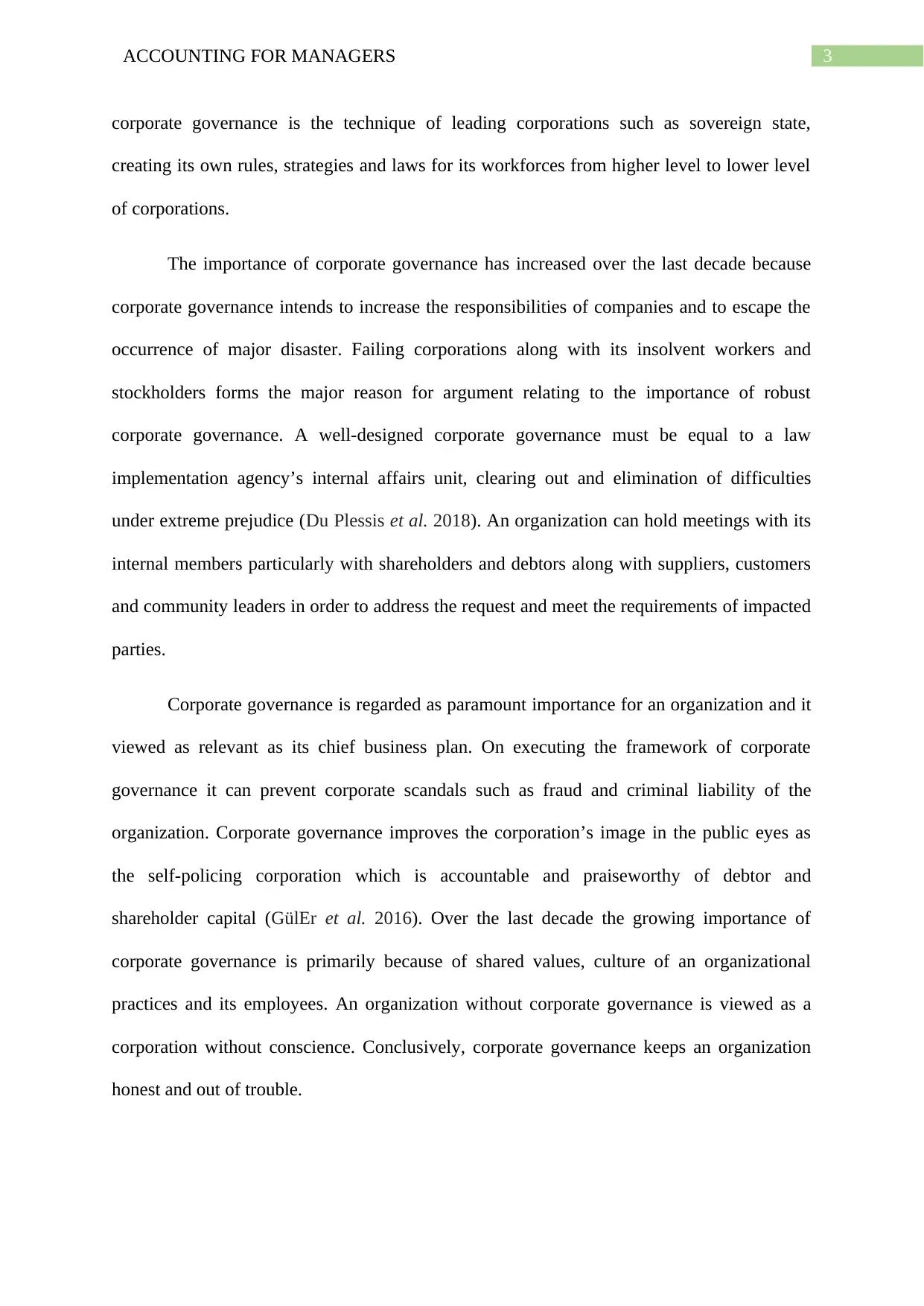
3ACCOUNTING FOR MANAGERS
corporate governance is the technique of leading corporations such as sovereign state,
creating its own rules, strategies and laws for its workforces from higher level to lower level
of corporations.
The importance of corporate governance has increased over the last decade because
corporate governance intends to increase the responsibilities of companies and to escape the
occurrence of major disaster. Failing corporations along with its insolvent workers and
stockholders forms the major reason for argument relating to the importance of robust
corporate governance. A well-designed corporate governance must be equal to a law
implementation agency’s internal affairs unit, clearing out and elimination of difficulties
under extreme prejudice (Du Plessis et al. 2018). An organization can hold meetings with its
internal members particularly with shareholders and debtors along with suppliers, customers
and community leaders in order to address the request and meet the requirements of impacted
parties.
Corporate governance is regarded as paramount importance for an organization and it
viewed as relevant as its chief business plan. On executing the framework of corporate
governance it can prevent corporate scandals such as fraud and criminal liability of the
organization. Corporate governance improves the corporation’s image in the public eyes as
the self-policing corporation which is accountable and praiseworthy of debtor and
shareholder capital (GülEr et al. 2016). Over the last decade the growing importance of
corporate governance is primarily because of shared values, culture of an organizational
practices and its employees. An organization without corporate governance is viewed as a
corporation without conscience. Conclusively, corporate governance keeps an organization
honest and out of trouble.
corporate governance is the technique of leading corporations such as sovereign state,
creating its own rules, strategies and laws for its workforces from higher level to lower level
of corporations.
The importance of corporate governance has increased over the last decade because
corporate governance intends to increase the responsibilities of companies and to escape the
occurrence of major disaster. Failing corporations along with its insolvent workers and
stockholders forms the major reason for argument relating to the importance of robust
corporate governance. A well-designed corporate governance must be equal to a law
implementation agency’s internal affairs unit, clearing out and elimination of difficulties
under extreme prejudice (Du Plessis et al. 2018). An organization can hold meetings with its
internal members particularly with shareholders and debtors along with suppliers, customers
and community leaders in order to address the request and meet the requirements of impacted
parties.
Corporate governance is regarded as paramount importance for an organization and it
viewed as relevant as its chief business plan. On executing the framework of corporate
governance it can prevent corporate scandals such as fraud and criminal liability of the
organization. Corporate governance improves the corporation’s image in the public eyes as
the self-policing corporation which is accountable and praiseworthy of debtor and
shareholder capital (GülEr et al. 2016). Over the last decade the growing importance of
corporate governance is primarily because of shared values, culture of an organizational
practices and its employees. An organization without corporate governance is viewed as a
corporation without conscience. Conclusively, corporate governance keeps an organization
honest and out of trouble.
Paraphrase This Document
Need a fresh take? Get an instant paraphrase of this document with our AI Paraphraser
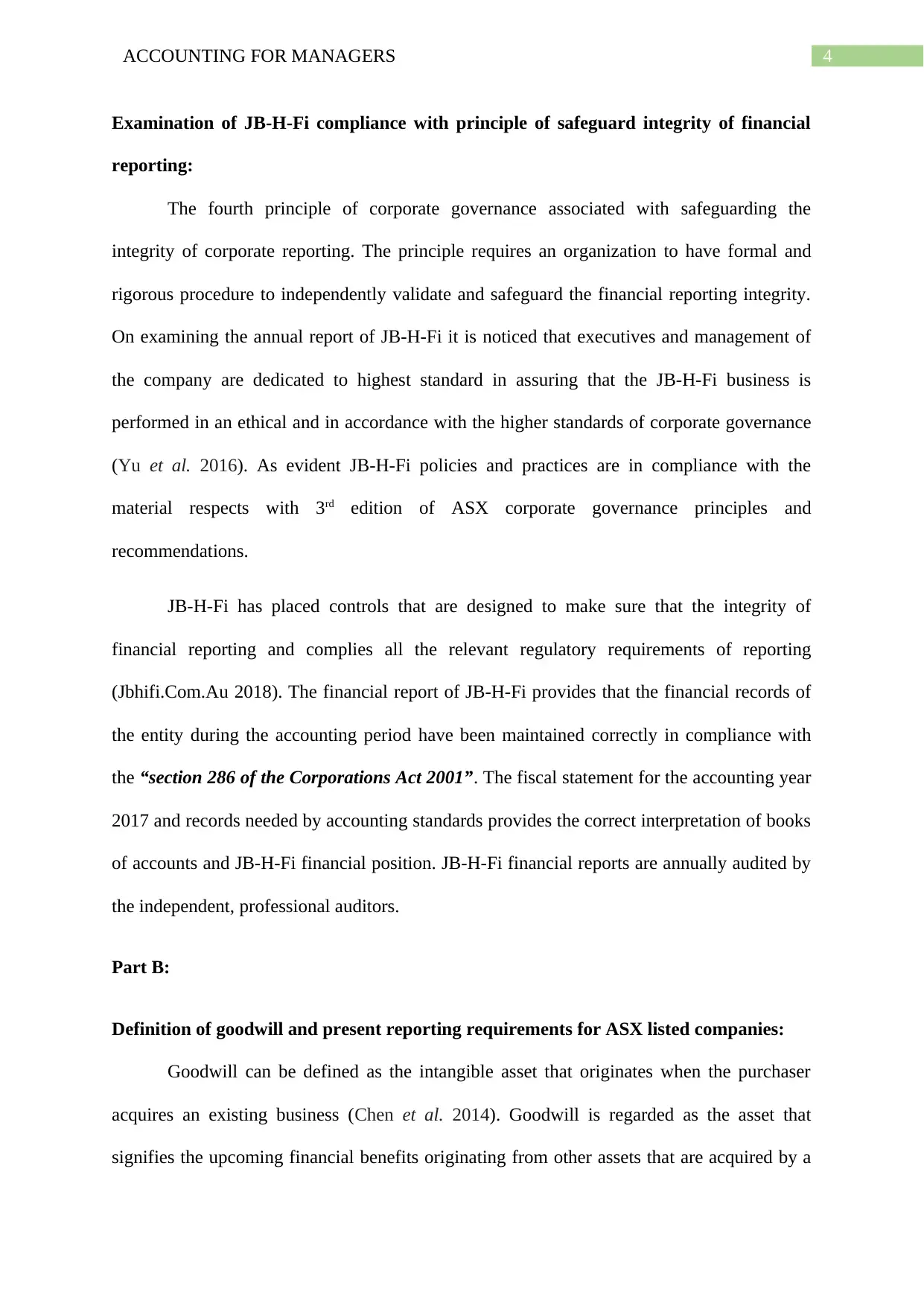
4ACCOUNTING FOR MANAGERS
Examination of JB-H-Fi compliance with principle of safeguard integrity of financial
reporting:
The fourth principle of corporate governance associated with safeguarding the
integrity of corporate reporting. The principle requires an organization to have formal and
rigorous procedure to independently validate and safeguard the financial reporting integrity.
On examining the annual report of JB-H-Fi it is noticed that executives and management of
the company are dedicated to highest standard in assuring that the JB-H-Fi business is
performed in an ethical and in accordance with the higher standards of corporate governance
(Yu et al. 2016). As evident JB-H-Fi policies and practices are in compliance with the
material respects with 3rd edition of ASX corporate governance principles and
recommendations.
JB-H-Fi has placed controls that are designed to make sure that the integrity of
financial reporting and complies all the relevant regulatory requirements of reporting
(Jbhifi.Com.Au 2018). The financial report of JB-H-Fi provides that the financial records of
the entity during the accounting period have been maintained correctly in compliance with
the “section 286 of the Corporations Act 2001”. The fiscal statement for the accounting year
2017 and records needed by accounting standards provides the correct interpretation of books
of accounts and JB-H-Fi financial position. JB-H-Fi financial reports are annually audited by
the independent, professional auditors.
Part B:
Definition of goodwill and present reporting requirements for ASX listed companies:
Goodwill can be defined as the intangible asset that originates when the purchaser
acquires an existing business (Chen et al. 2014). Goodwill is regarded as the asset that
signifies the upcoming financial benefits originating from other assets that are acquired by a
Examination of JB-H-Fi compliance with principle of safeguard integrity of financial
reporting:
The fourth principle of corporate governance associated with safeguarding the
integrity of corporate reporting. The principle requires an organization to have formal and
rigorous procedure to independently validate and safeguard the financial reporting integrity.
On examining the annual report of JB-H-Fi it is noticed that executives and management of
the company are dedicated to highest standard in assuring that the JB-H-Fi business is
performed in an ethical and in accordance with the higher standards of corporate governance
(Yu et al. 2016). As evident JB-H-Fi policies and practices are in compliance with the
material respects with 3rd edition of ASX corporate governance principles and
recommendations.
JB-H-Fi has placed controls that are designed to make sure that the integrity of
financial reporting and complies all the relevant regulatory requirements of reporting
(Jbhifi.Com.Au 2018). The financial report of JB-H-Fi provides that the financial records of
the entity during the accounting period have been maintained correctly in compliance with
the “section 286 of the Corporations Act 2001”. The fiscal statement for the accounting year
2017 and records needed by accounting standards provides the correct interpretation of books
of accounts and JB-H-Fi financial position. JB-H-Fi financial reports are annually audited by
the independent, professional auditors.
Part B:
Definition of goodwill and present reporting requirements for ASX listed companies:
Goodwill can be defined as the intangible asset that originates when the purchaser
acquires an existing business (Chen et al. 2014). Goodwill is regarded as the asset that
signifies the upcoming financial benefits originating from other assets that are acquired by a
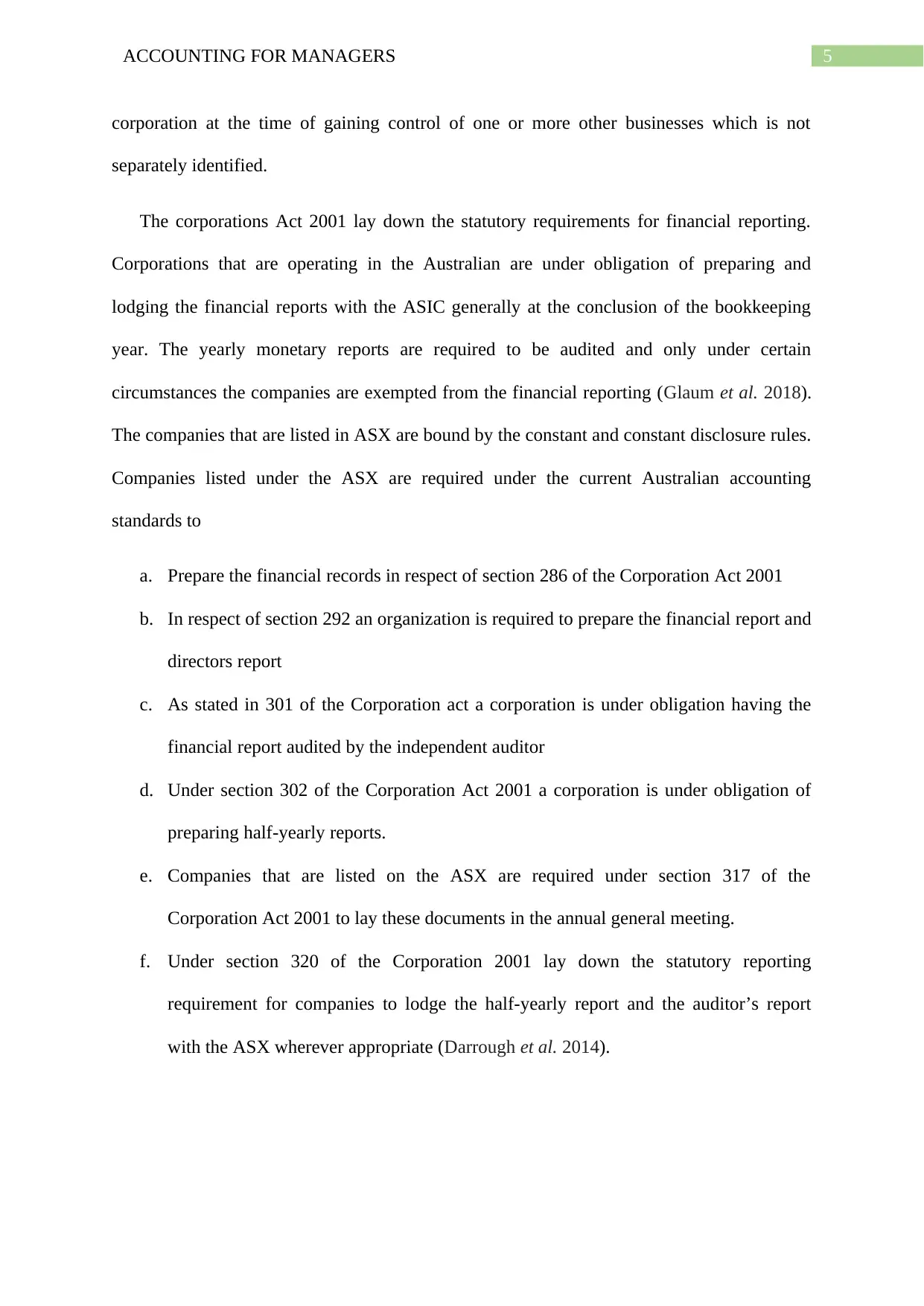
5ACCOUNTING FOR MANAGERS
corporation at the time of gaining control of one or more other businesses which is not
separately identified.
The corporations Act 2001 lay down the statutory requirements for financial reporting.
Corporations that are operating in the Australian are under obligation of preparing and
lodging the financial reports with the ASIC generally at the conclusion of the bookkeeping
year. The yearly monetary reports are required to be audited and only under certain
circumstances the companies are exempted from the financial reporting (Glaum et al. 2018).
The companies that are listed in ASX are bound by the constant and constant disclosure rules.
Companies listed under the ASX are required under the current Australian accounting
standards to
a. Prepare the financial records in respect of section 286 of the Corporation Act 2001
b. In respect of section 292 an organization is required to prepare the financial report and
directors report
c. As stated in 301 of the Corporation act a corporation is under obligation having the
financial report audited by the independent auditor
d. Under section 302 of the Corporation Act 2001 a corporation is under obligation of
preparing half-yearly reports.
e. Companies that are listed on the ASX are required under section 317 of the
Corporation Act 2001 to lay these documents in the annual general meeting.
f. Under section 320 of the Corporation 2001 lay down the statutory reporting
requirement for companies to lodge the half-yearly report and the auditor’s report
with the ASX wherever appropriate (Darrough et al. 2014).
corporation at the time of gaining control of one or more other businesses which is not
separately identified.
The corporations Act 2001 lay down the statutory requirements for financial reporting.
Corporations that are operating in the Australian are under obligation of preparing and
lodging the financial reports with the ASIC generally at the conclusion of the bookkeeping
year. The yearly monetary reports are required to be audited and only under certain
circumstances the companies are exempted from the financial reporting (Glaum et al. 2018).
The companies that are listed in ASX are bound by the constant and constant disclosure rules.
Companies listed under the ASX are required under the current Australian accounting
standards to
a. Prepare the financial records in respect of section 286 of the Corporation Act 2001
b. In respect of section 292 an organization is required to prepare the financial report and
directors report
c. As stated in 301 of the Corporation act a corporation is under obligation having the
financial report audited by the independent auditor
d. Under section 302 of the Corporation Act 2001 a corporation is under obligation of
preparing half-yearly reports.
e. Companies that are listed on the ASX are required under section 317 of the
Corporation Act 2001 to lay these documents in the annual general meeting.
f. Under section 320 of the Corporation 2001 lay down the statutory reporting
requirement for companies to lodge the half-yearly report and the auditor’s report
with the ASX wherever appropriate (Darrough et al. 2014).
⊘ This is a preview!⊘
Do you want full access?
Subscribe today to unlock all pages.

Trusted by 1+ million students worldwide
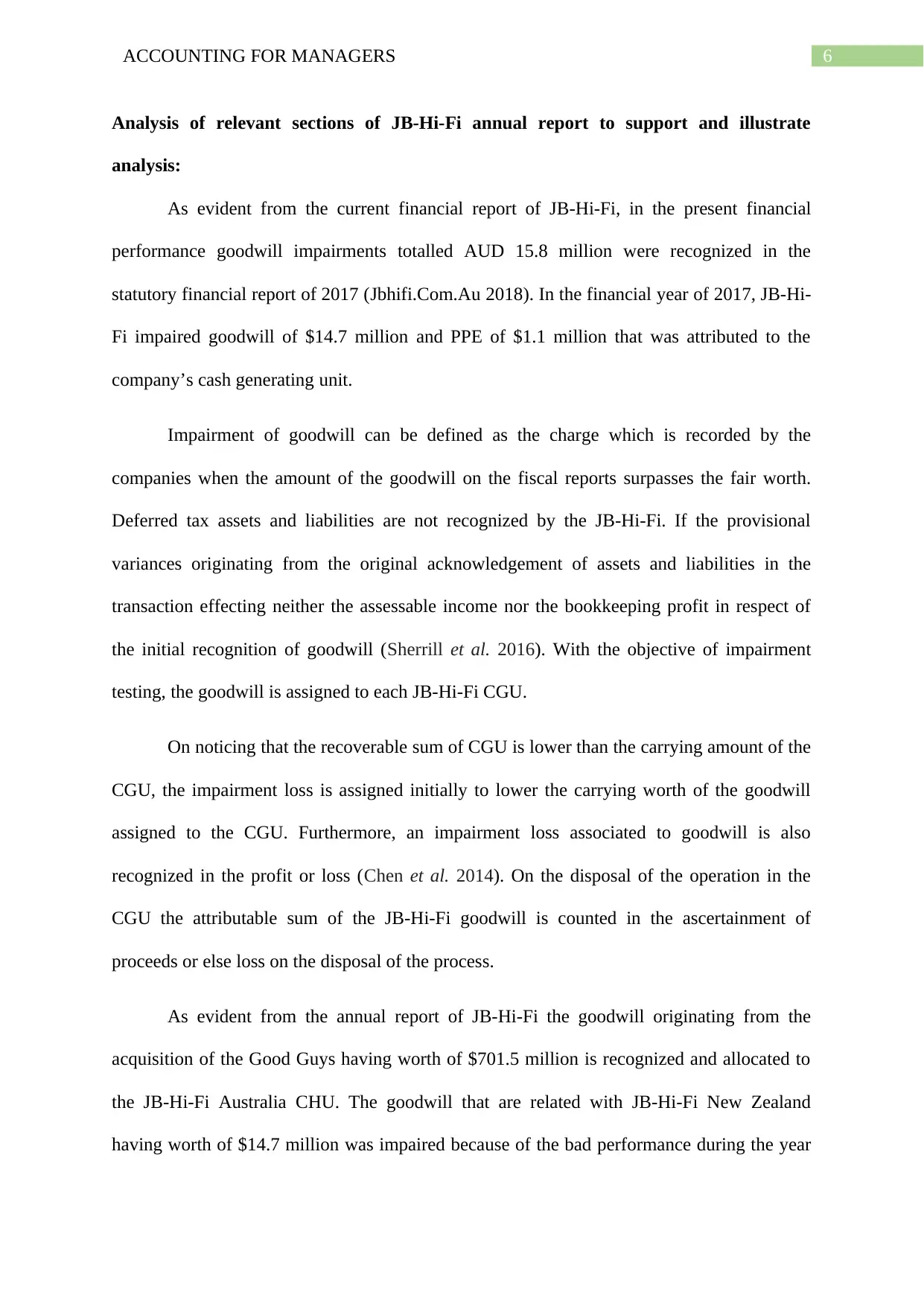
6ACCOUNTING FOR MANAGERS
Analysis of relevant sections of JB-Hi-Fi annual report to support and illustrate
analysis:
As evident from the current financial report of JB-Hi-Fi, in the present financial
performance goodwill impairments totalled AUD 15.8 million were recognized in the
statutory financial report of 2017 (Jbhifi.Com.Au 2018). In the financial year of 2017, JB-Hi-
Fi impaired goodwill of $14.7 million and PPE of $1.1 million that was attributed to the
company’s cash generating unit.
Impairment of goodwill can be defined as the charge which is recorded by the
companies when the amount of the goodwill on the fiscal reports surpasses the fair worth.
Deferred tax assets and liabilities are not recognized by the JB-Hi-Fi. If the provisional
variances originating from the original acknowledgement of assets and liabilities in the
transaction effecting neither the assessable income nor the bookkeeping profit in respect of
the initial recognition of goodwill (Sherrill et al. 2016). With the objective of impairment
testing, the goodwill is assigned to each JB-Hi-Fi CGU.
On noticing that the recoverable sum of CGU is lower than the carrying amount of the
CGU, the impairment loss is assigned initially to lower the carrying worth of the goodwill
assigned to the CGU. Furthermore, an impairment loss associated to goodwill is also
recognized in the profit or loss (Chen et al. 2014). On the disposal of the operation in the
CGU the attributable sum of the JB-Hi-Fi goodwill is counted in the ascertainment of
proceeds or else loss on the disposal of the process.
As evident from the annual report of JB-Hi-Fi the goodwill originating from the
acquisition of the Good Guys having worth of $701.5 million is recognized and allocated to
the JB-Hi-Fi Australia CHU. The goodwill that are related with JB-Hi-Fi New Zealand
having worth of $14.7 million was impaired because of the bad performance during the year
Analysis of relevant sections of JB-Hi-Fi annual report to support and illustrate
analysis:
As evident from the current financial report of JB-Hi-Fi, in the present financial
performance goodwill impairments totalled AUD 15.8 million were recognized in the
statutory financial report of 2017 (Jbhifi.Com.Au 2018). In the financial year of 2017, JB-Hi-
Fi impaired goodwill of $14.7 million and PPE of $1.1 million that was attributed to the
company’s cash generating unit.
Impairment of goodwill can be defined as the charge which is recorded by the
companies when the amount of the goodwill on the fiscal reports surpasses the fair worth.
Deferred tax assets and liabilities are not recognized by the JB-Hi-Fi. If the provisional
variances originating from the original acknowledgement of assets and liabilities in the
transaction effecting neither the assessable income nor the bookkeeping profit in respect of
the initial recognition of goodwill (Sherrill et al. 2016). With the objective of impairment
testing, the goodwill is assigned to each JB-Hi-Fi CGU.
On noticing that the recoverable sum of CGU is lower than the carrying amount of the
CGU, the impairment loss is assigned initially to lower the carrying worth of the goodwill
assigned to the CGU. Furthermore, an impairment loss associated to goodwill is also
recognized in the profit or loss (Chen et al. 2014). On the disposal of the operation in the
CGU the attributable sum of the JB-Hi-Fi goodwill is counted in the ascertainment of
proceeds or else loss on the disposal of the process.
As evident from the annual report of JB-Hi-Fi the goodwill originating from the
acquisition of the Good Guys having worth of $701.5 million is recognized and allocated to
the JB-Hi-Fi Australia CHU. The goodwill that are related with JB-Hi-Fi New Zealand
having worth of $14.7 million was impaired because of the bad performance during the year
Paraphrase This Document
Need a fresh take? Get an instant paraphrase of this document with our AI Paraphraser
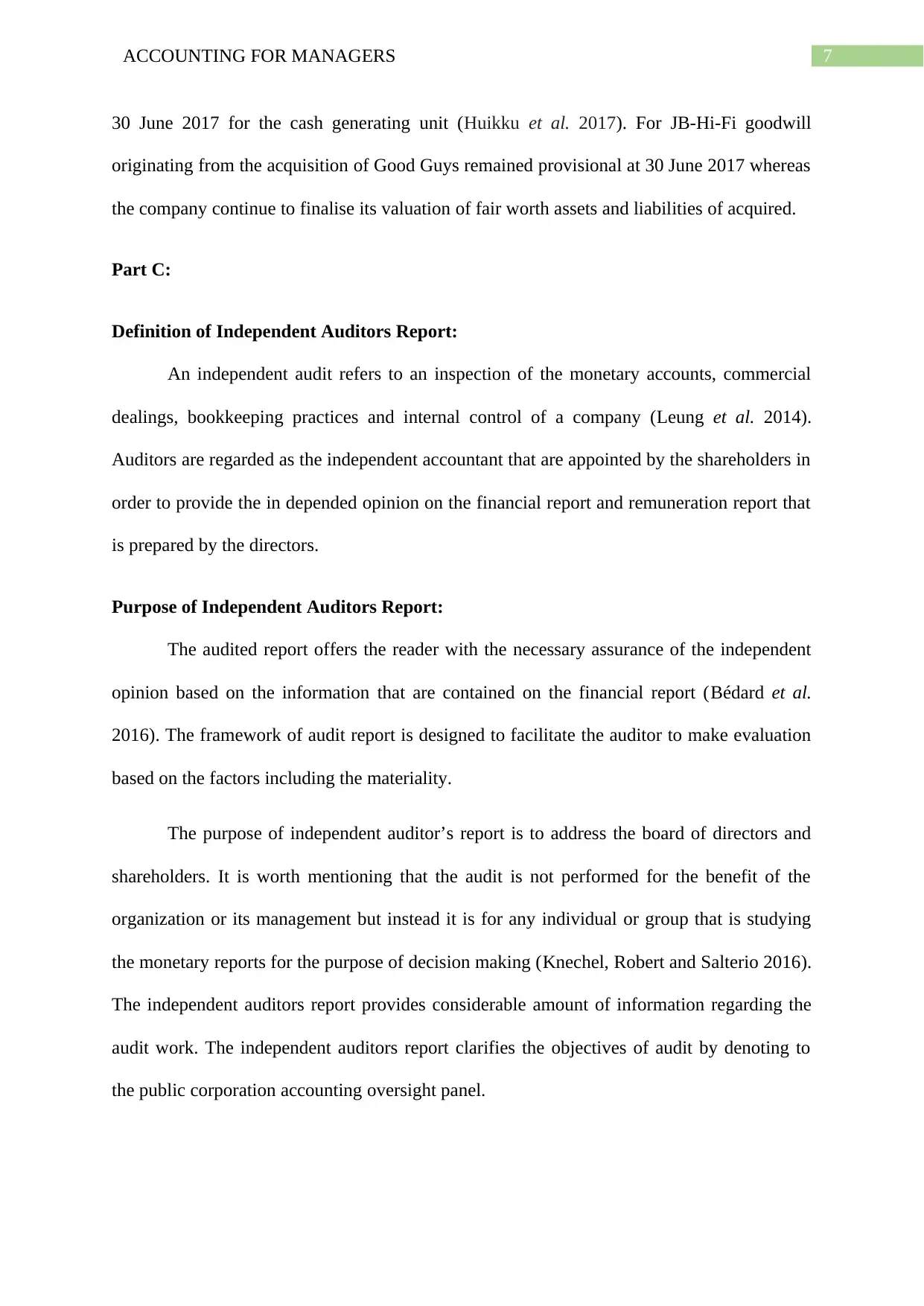
7ACCOUNTING FOR MANAGERS
30 June 2017 for the cash generating unit (Huikku et al. 2017). For JB-Hi-Fi goodwill
originating from the acquisition of Good Guys remained provisional at 30 June 2017 whereas
the company continue to finalise its valuation of fair worth assets and liabilities of acquired.
Part C:
Definition of Independent Auditors Report:
An independent audit refers to an inspection of the monetary accounts, commercial
dealings, bookkeeping practices and internal control of a company (Leung et al. 2014).
Auditors are regarded as the independent accountant that are appointed by the shareholders in
order to provide the in depended opinion on the financial report and remuneration report that
is prepared by the directors.
Purpose of Independent Auditors Report:
The audited report offers the reader with the necessary assurance of the independent
opinion based on the information that are contained on the financial report (Bédard et al.
2016). The framework of audit report is designed to facilitate the auditor to make evaluation
based on the factors including the materiality.
The purpose of independent auditor’s report is to address the board of directors and
shareholders. It is worth mentioning that the audit is not performed for the benefit of the
organization or its management but instead it is for any individual or group that is studying
the monetary reports for the purpose of decision making (Knechel, Robert and Salterio 2016).
The independent auditors report provides considerable amount of information regarding the
audit work. The independent auditors report clarifies the objectives of audit by denoting to
the public corporation accounting oversight panel.
30 June 2017 for the cash generating unit (Huikku et al. 2017). For JB-Hi-Fi goodwill
originating from the acquisition of Good Guys remained provisional at 30 June 2017 whereas
the company continue to finalise its valuation of fair worth assets and liabilities of acquired.
Part C:
Definition of Independent Auditors Report:
An independent audit refers to an inspection of the monetary accounts, commercial
dealings, bookkeeping practices and internal control of a company (Leung et al. 2014).
Auditors are regarded as the independent accountant that are appointed by the shareholders in
order to provide the in depended opinion on the financial report and remuneration report that
is prepared by the directors.
Purpose of Independent Auditors Report:
The audited report offers the reader with the necessary assurance of the independent
opinion based on the information that are contained on the financial report (Bédard et al.
2016). The framework of audit report is designed to facilitate the auditor to make evaluation
based on the factors including the materiality.
The purpose of independent auditor’s report is to address the board of directors and
shareholders. It is worth mentioning that the audit is not performed for the benefit of the
organization or its management but instead it is for any individual or group that is studying
the monetary reports for the purpose of decision making (Knechel, Robert and Salterio 2016).
The independent auditors report provides considerable amount of information regarding the
audit work. The independent auditors report clarifies the objectives of audit by denoting to
the public corporation accounting oversight panel.
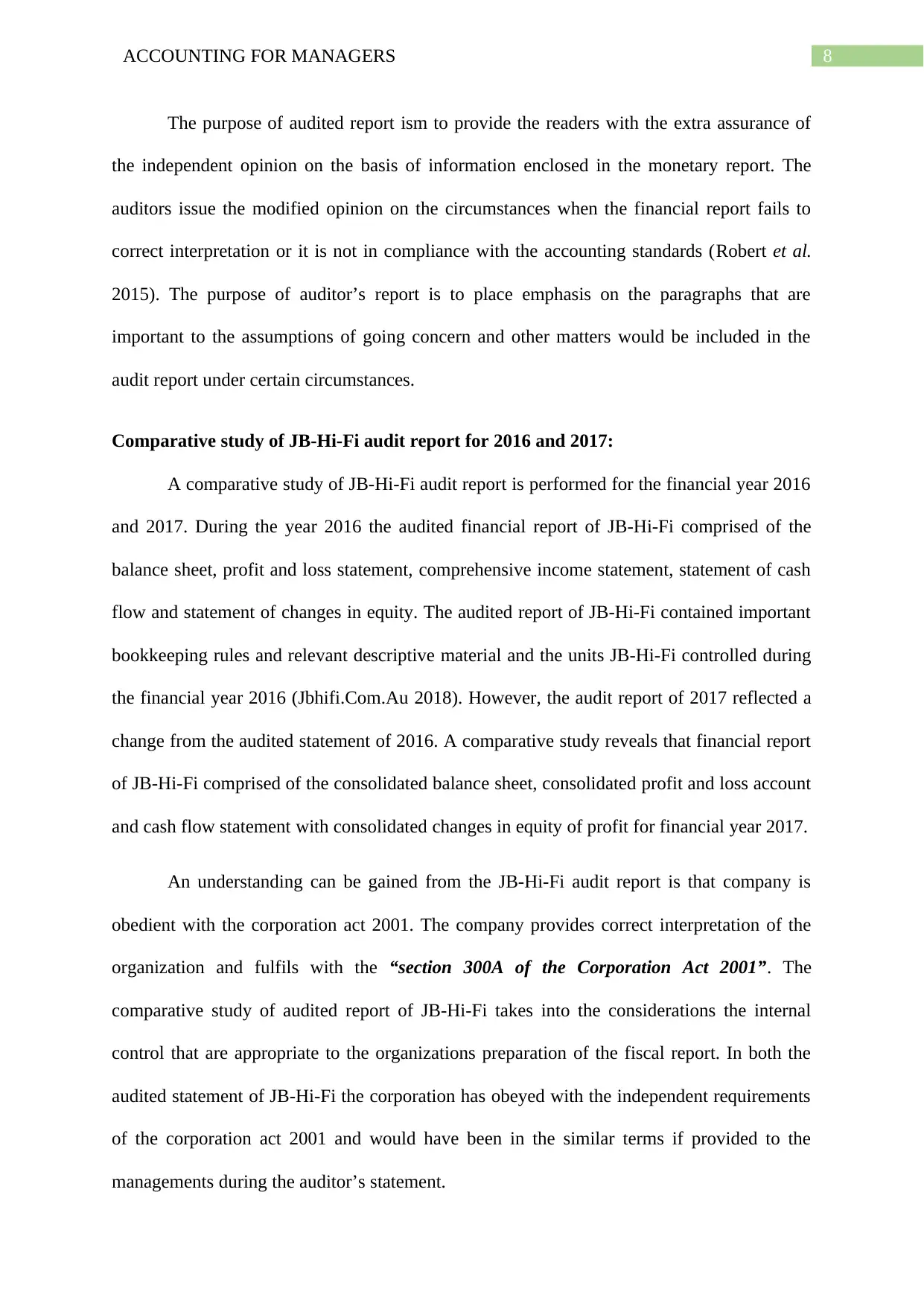
8ACCOUNTING FOR MANAGERS
The purpose of audited report ism to provide the readers with the extra assurance of
the independent opinion on the basis of information enclosed in the monetary report. The
auditors issue the modified opinion on the circumstances when the financial report fails to
correct interpretation or it is not in compliance with the accounting standards (Robert et al.
2015). The purpose of auditor’s report is to place emphasis on the paragraphs that are
important to the assumptions of going concern and other matters would be included in the
audit report under certain circumstances.
Comparative study of JB-Hi-Fi audit report for 2016 and 2017:
A comparative study of JB-Hi-Fi audit report is performed for the financial year 2016
and 2017. During the year 2016 the audited financial report of JB-Hi-Fi comprised of the
balance sheet, profit and loss statement, comprehensive income statement, statement of cash
flow and statement of changes in equity. The audited report of JB-Hi-Fi contained important
bookkeeping rules and relevant descriptive material and the units JB-Hi-Fi controlled during
the financial year 2016 (Jbhifi.Com.Au 2018). However, the audit report of 2017 reflected a
change from the audited statement of 2016. A comparative study reveals that financial report
of JB-Hi-Fi comprised of the consolidated balance sheet, consolidated profit and loss account
and cash flow statement with consolidated changes in equity of profit for financial year 2017.
An understanding can be gained from the JB-Hi-Fi audit report is that company is
obedient with the corporation act 2001. The company provides correct interpretation of the
organization and fulfils with the “section 300A of the Corporation Act 2001”. The
comparative study of audited report of JB-Hi-Fi takes into the considerations the internal
control that are appropriate to the organizations preparation of the fiscal report. In both the
audited statement of JB-Hi-Fi the corporation has obeyed with the independent requirements
of the corporation act 2001 and would have been in the similar terms if provided to the
managements during the auditor’s statement.
The purpose of audited report ism to provide the readers with the extra assurance of
the independent opinion on the basis of information enclosed in the monetary report. The
auditors issue the modified opinion on the circumstances when the financial report fails to
correct interpretation or it is not in compliance with the accounting standards (Robert et al.
2015). The purpose of auditor’s report is to place emphasis on the paragraphs that are
important to the assumptions of going concern and other matters would be included in the
audit report under certain circumstances.
Comparative study of JB-Hi-Fi audit report for 2016 and 2017:
A comparative study of JB-Hi-Fi audit report is performed for the financial year 2016
and 2017. During the year 2016 the audited financial report of JB-Hi-Fi comprised of the
balance sheet, profit and loss statement, comprehensive income statement, statement of cash
flow and statement of changes in equity. The audited report of JB-Hi-Fi contained important
bookkeeping rules and relevant descriptive material and the units JB-Hi-Fi controlled during
the financial year 2016 (Jbhifi.Com.Au 2018). However, the audit report of 2017 reflected a
change from the audited statement of 2016. A comparative study reveals that financial report
of JB-Hi-Fi comprised of the consolidated balance sheet, consolidated profit and loss account
and cash flow statement with consolidated changes in equity of profit for financial year 2017.
An understanding can be gained from the JB-Hi-Fi audit report is that company is
obedient with the corporation act 2001. The company provides correct interpretation of the
organization and fulfils with the “section 300A of the Corporation Act 2001”. The
comparative study of audited report of JB-Hi-Fi takes into the considerations the internal
control that are appropriate to the organizations preparation of the fiscal report. In both the
audited statement of JB-Hi-Fi the corporation has obeyed with the independent requirements
of the corporation act 2001 and would have been in the similar terms if provided to the
managements during the auditor’s statement.
⊘ This is a preview!⊘
Do you want full access?
Subscribe today to unlock all pages.

Trusted by 1+ million students worldwide
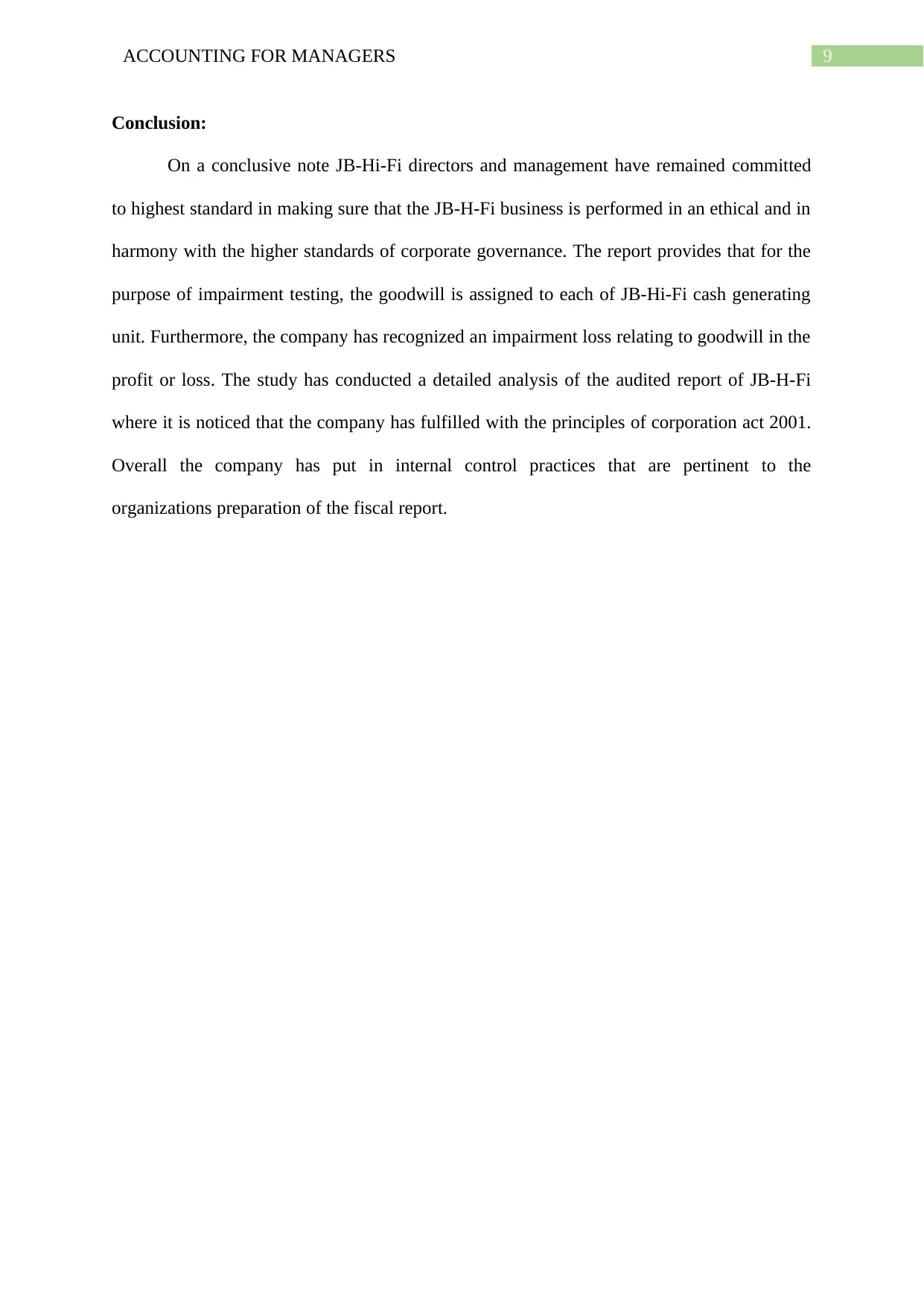
9ACCOUNTING FOR MANAGERS
Conclusion:
On a conclusive note JB-Hi-Fi directors and management have remained committed
to highest standard in making sure that the JB-H-Fi business is performed in an ethical and in
harmony with the higher standards of corporate governance. The report provides that for the
purpose of impairment testing, the goodwill is assigned to each of JB-Hi-Fi cash generating
unit. Furthermore, the company has recognized an impairment loss relating to goodwill in the
profit or loss. The study has conducted a detailed analysis of the audited report of JB-H-Fi
where it is noticed that the company has fulfilled with the principles of corporation act 2001.
Overall the company has put in internal control practices that are pertinent to the
organizations preparation of the fiscal report.
Conclusion:
On a conclusive note JB-Hi-Fi directors and management have remained committed
to highest standard in making sure that the JB-H-Fi business is performed in an ethical and in
harmony with the higher standards of corporate governance. The report provides that for the
purpose of impairment testing, the goodwill is assigned to each of JB-Hi-Fi cash generating
unit. Furthermore, the company has recognized an impairment loss relating to goodwill in the
profit or loss. The study has conducted a detailed analysis of the audited report of JB-H-Fi
where it is noticed that the company has fulfilled with the principles of corporation act 2001.
Overall the company has put in internal control practices that are pertinent to the
organizations preparation of the fiscal report.
Paraphrase This Document
Need a fresh take? Get an instant paraphrase of this document with our AI Paraphraser
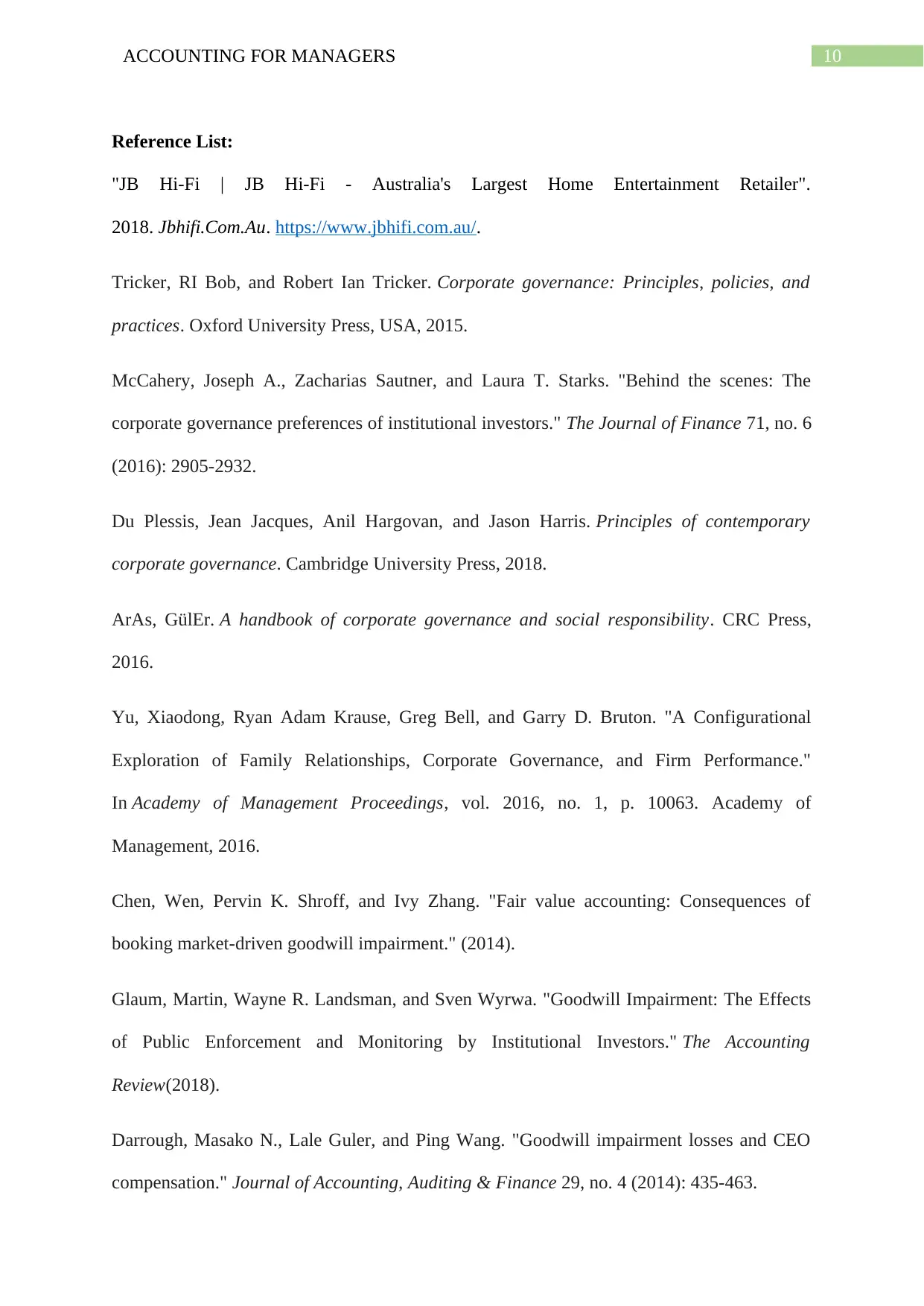
10ACCOUNTING FOR MANAGERS
Reference List:
"JB Hi-Fi | JB Hi-Fi - Australia's Largest Home Entertainment Retailer".
2018. Jbhifi.Com.Au. https://www.jbhifi.com.au/.
Tricker, RI Bob, and Robert Ian Tricker. Corporate governance: Principles, policies, and
practices. Oxford University Press, USA, 2015.
McCahery, Joseph A., Zacharias Sautner, and Laura T. Starks. "Behind the scenes: The
corporate governance preferences of institutional investors." The Journal of Finance 71, no. 6
(2016): 2905-2932.
Du Plessis, Jean Jacques, Anil Hargovan, and Jason Harris. Principles of contemporary
corporate governance. Cambridge University Press, 2018.
ArAs, GülEr. A handbook of corporate governance and social responsibility. CRC Press,
2016.
Yu, Xiaodong, Ryan Adam Krause, Greg Bell, and Garry D. Bruton. "A Configurational
Exploration of Family Relationships, Corporate Governance, and Firm Performance."
In Academy of Management Proceedings, vol. 2016, no. 1, p. 10063. Academy of
Management, 2016.
Chen, Wen, Pervin K. Shroff, and Ivy Zhang. "Fair value accounting: Consequences of
booking market-driven goodwill impairment." (2014).
Glaum, Martin, Wayne R. Landsman, and Sven Wyrwa. "Goodwill Impairment: The Effects
of Public Enforcement and Monitoring by Institutional Investors." The Accounting
Review(2018).
Darrough, Masako N., Lale Guler, and Ping Wang. "Goodwill impairment losses and CEO
compensation." Journal of Accounting, Auditing & Finance 29, no. 4 (2014): 435-463.
Reference List:
"JB Hi-Fi | JB Hi-Fi - Australia's Largest Home Entertainment Retailer".
2018. Jbhifi.Com.Au. https://www.jbhifi.com.au/.
Tricker, RI Bob, and Robert Ian Tricker. Corporate governance: Principles, policies, and
practices. Oxford University Press, USA, 2015.
McCahery, Joseph A., Zacharias Sautner, and Laura T. Starks. "Behind the scenes: The
corporate governance preferences of institutional investors." The Journal of Finance 71, no. 6
(2016): 2905-2932.
Du Plessis, Jean Jacques, Anil Hargovan, and Jason Harris. Principles of contemporary
corporate governance. Cambridge University Press, 2018.
ArAs, GülEr. A handbook of corporate governance and social responsibility. CRC Press,
2016.
Yu, Xiaodong, Ryan Adam Krause, Greg Bell, and Garry D. Bruton. "A Configurational
Exploration of Family Relationships, Corporate Governance, and Firm Performance."
In Academy of Management Proceedings, vol. 2016, no. 1, p. 10063. Academy of
Management, 2016.
Chen, Wen, Pervin K. Shroff, and Ivy Zhang. "Fair value accounting: Consequences of
booking market-driven goodwill impairment." (2014).
Glaum, Martin, Wayne R. Landsman, and Sven Wyrwa. "Goodwill Impairment: The Effects
of Public Enforcement and Monitoring by Institutional Investors." The Accounting
Review(2018).
Darrough, Masako N., Lale Guler, and Ping Wang. "Goodwill impairment losses and CEO
compensation." Journal of Accounting, Auditing & Finance 29, no. 4 (2014): 435-463.
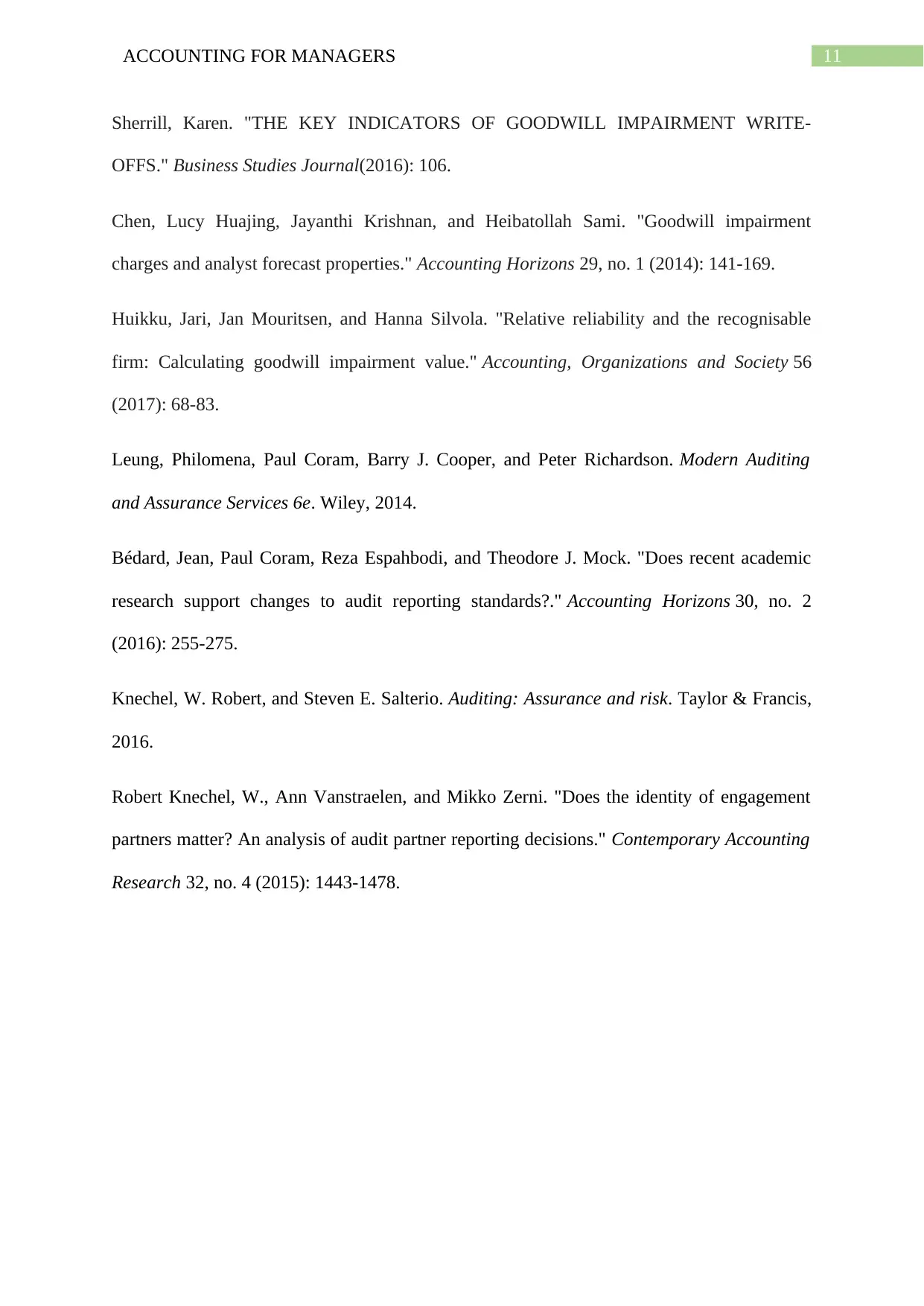
11ACCOUNTING FOR MANAGERS
Sherrill, Karen. "THE KEY INDICATORS OF GOODWILL IMPAIRMENT WRITE-
OFFS." Business Studies Journal(2016): 106.
Chen, Lucy Huajing, Jayanthi Krishnan, and Heibatollah Sami. "Goodwill impairment
charges and analyst forecast properties." Accounting Horizons 29, no. 1 (2014): 141-169.
Huikku, Jari, Jan Mouritsen, and Hanna Silvola. "Relative reliability and the recognisable
firm: Calculating goodwill impairment value." Accounting, Organizations and Society 56
(2017): 68-83.
Leung, Philomena, Paul Coram, Barry J. Cooper, and Peter Richardson. Modern Auditing
and Assurance Services 6e. Wiley, 2014.
Bédard, Jean, Paul Coram, Reza Espahbodi, and Theodore J. Mock. "Does recent academic
research support changes to audit reporting standards?." Accounting Horizons 30, no. 2
(2016): 255-275.
Knechel, W. Robert, and Steven E. Salterio. Auditing: Assurance and risk. Taylor & Francis,
2016.
Robert Knechel, W., Ann Vanstraelen, and Mikko Zerni. "Does the identity of engagement
partners matter? An analysis of audit partner reporting decisions." Contemporary Accounting
Research 32, no. 4 (2015): 1443-1478.
Sherrill, Karen. "THE KEY INDICATORS OF GOODWILL IMPAIRMENT WRITE-
OFFS." Business Studies Journal(2016): 106.
Chen, Lucy Huajing, Jayanthi Krishnan, and Heibatollah Sami. "Goodwill impairment
charges and analyst forecast properties." Accounting Horizons 29, no. 1 (2014): 141-169.
Huikku, Jari, Jan Mouritsen, and Hanna Silvola. "Relative reliability and the recognisable
firm: Calculating goodwill impairment value." Accounting, Organizations and Society 56
(2017): 68-83.
Leung, Philomena, Paul Coram, Barry J. Cooper, and Peter Richardson. Modern Auditing
and Assurance Services 6e. Wiley, 2014.
Bédard, Jean, Paul Coram, Reza Espahbodi, and Theodore J. Mock. "Does recent academic
research support changes to audit reporting standards?." Accounting Horizons 30, no. 2
(2016): 255-275.
Knechel, W. Robert, and Steven E. Salterio. Auditing: Assurance and risk. Taylor & Francis,
2016.
Robert Knechel, W., Ann Vanstraelen, and Mikko Zerni. "Does the identity of engagement
partners matter? An analysis of audit partner reporting decisions." Contemporary Accounting
Research 32, no. 4 (2015): 1443-1478.
⊘ This is a preview!⊘
Do you want full access?
Subscribe today to unlock all pages.

Trusted by 1+ million students worldwide
1 out of 12
Related Documents
Your All-in-One AI-Powered Toolkit for Academic Success.
+13062052269
info@desklib.com
Available 24*7 on WhatsApp / Email
![[object Object]](/_next/static/media/star-bottom.7253800d.svg)
Unlock your academic potential
Copyright © 2020–2025 A2Z Services. All Rights Reserved. Developed and managed by ZUCOL.





